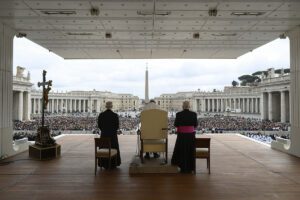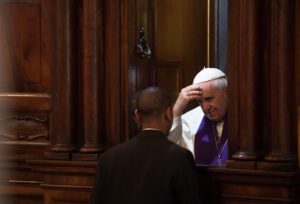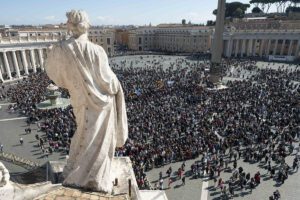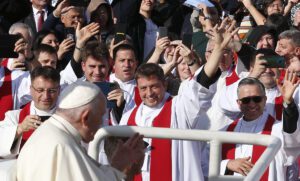VATICAN CITY (CNS) – The mission to spread the Gospel message of God’s love and of salvation in Christ is entrusted to all the baptized who are called to work together and never set out alone, Pope Francis said.
The “ecclesial” dimension of evangelization “is binding and guarantees the authenticity of Christian proclamation,” the pope said at his weekly general audience March 8 in St. Peter’s Square, the first audience held outdoors in 2023.
At the end of the audience, Pope Francis noted the day’s celebration of International Women’s Day, thanking women “for their commitment to building a more humane society through their ability to grasp reality with a creative gaze and tender heart. This is a privilege only of women.”

The pope not only offered “a special blessing for all the women in the square,” but asked the crowd to join him in “a round of applause for women. They deserve it!”
Continuing his series of audience talks about evangelization, Pope Francis said the support and confirmation of the church in mission work is necessary “because the temptation of proceeding alone is always lurking, especially when the path becomes impassable, and we feel the burden of the commitment.”
But it also is tempting “to adopt the worldly logic of numbers and polls” or to rely on one’s own ideas and programs rather than on the Holy Spirit, he said. Having a plan and analyzing what is working can be helpful but is always “secondary” to “the strength the Spirit gives you to proclaim the truth of Jesus Christ.”
That truth, he said, is that “God’s love is not just for a little group, no, it’s for all, everyone, no one excluded.”
Quoting from the Second Vatican Council’s Decree on the Church’s Missionary Activity, Pope Francis said the task of the church is “to continue the mission of Christ, who was ‘sent to preach the Gospel to the poor,'” a task for which all the baptized are responsible.
Within the church there cannot be “active” members and “passive” members, he said. “There are not those who preach, those who proclaim the Gospel in one way or another and those who keep quiet. No.”
Pope Francis imagined a conversation:
“Are you Christian?”
“Yes, I’ve been baptized.”
“Do you evangelize?”
“What’s that mean?”
“If you do not evangelize,” he said, “if you do not give that witness of the baptism you have received, of the faith the Lord gave you, then you are not a good Christian.”
Faith is a gift that must be shared with others, “with a sense of responsibility” and a commitment to journey together with the rest of the church even when the going seems rough, the pope said.






